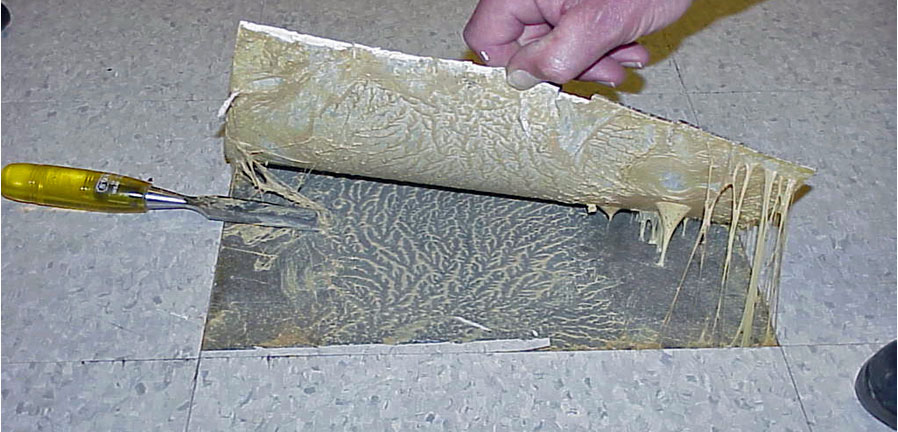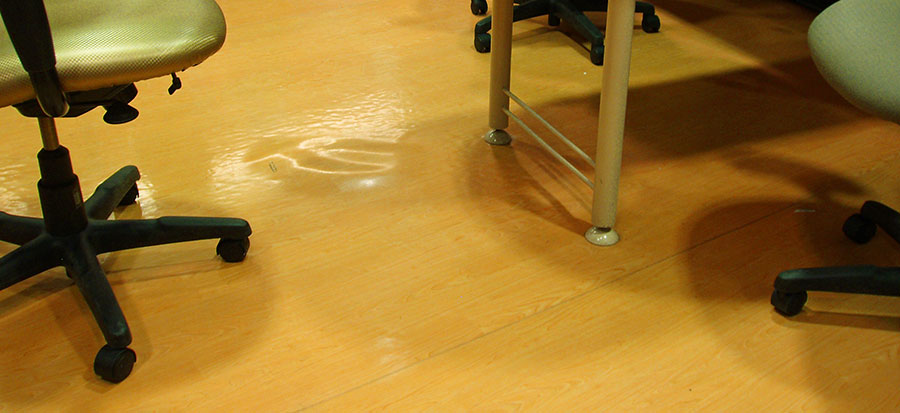4 Ugly Consequences of Excess Concrete Subfloor Moisture
Previously published in the 2020 January/February issue of Tile Magazine
Excess moisture from concrete subfloors can cause serious problems with all types of flooring. These range from aesthetic problems to health and safety hazards.
Here are four ugly consequences when moisture is trapped beneath a flooring system:
- Adhesive degradation
- Coating debonding
- Osmotic blistering
- Microbial attack

Adhesive failure caused by excess moisture in the concrete subfloor
Adhesive degradation occurs when a moisture-sensitive adhesive breaks down from exposure to too much Alkalinity. Excessive moisture allows alkaline materials to move to the top of the slab, where it can attack the concrete. This moisture allows the very basic makeup of concrete to attack the adhesive. The adhesive might begin to ooze from the seams, and the floor might lose its bond with the floor. Other problems include epoxy and resin floor coatings debonding from the concrete. Coatings can also develop osmotic blisters.
A microbial attack can also be a serious health concern. Howard Kanare, concrete moisture expert and author of “Concrete Floors and Moisture,” writes, “Excessive moisture trapped under floor finishes can create conditions for mold and mildew to grow. When flooring is removed, blooms of fungal spores can become airborne, and may cause allergic reactions or respiratory problems.”
All of these problems are caused by too much moisture in a concrete subfloor. That means you must determine whether the concrete is dry enough before you install a floor over it.
All concrete contains moisture, and a certain amount is not a problem. But when there’s too much moisture, it becomes a medium to allow the alkalinity to move up through “capillaries” in the concrete to attack the adhesive at the surface.
As water evaporates, water from deeper in the concrete moves through the concrete’s pores to the surface to replace it. Since water evaporates from the surface of the concrete, the surface is usually drier than the concrete deeper in the slab. So even if the slab looks dry, eventually much of the water deep in the slab will make its way to the surface. As the water collects under the flooring system installed on the slab, it brings serious problems with it.

Osmotic blisters happen when excess moisture in the concrete slab pushes up from the concrete slab subfloor.
So just looking at the slab isn’t enough to know if it’s dry. Using a test on the slab surface isn’t enough either. Only a test that can detect moisture deep in the center of the slab will be reliable.
Concrete moisture testing has been studied since the 1960s, and researchers have developed a scientifically proven test for measuring moisture levels deep in the center of a slab.
This test requires sensors for measuring the relative humidity (RH) of the air trapped in the concrete. These sensors are inserted into the slab at specific depths for accuracy. This has been determined to be the best way to get an accurate picture of how much moisture lies deep within the slab.
This test is called “the relative humidity test using in situ probes,” and it’s the basis for the ASTM F2170 standard.
Introducing the Wagner Meters Rapid RH® L6 system
The Rapid RH L6 system is the fastest, easiest, most cost-effective system for RH testing concrete slabs in compliance with ASTM F2170.
The Rapid RH L6 system employs single-use sensors for speed, economy, and ease of use. Once the L6 sensors are installed in the slab and equilibrated, there’s no need to move them from location to location and wait for them to equilibrate again. Repeat readings can be taken without additional equilibration time. And unlike reusable probes, the L6 sensors never need calibration because they come calibrated from the factory and include a NIST-traceable certificate of calibration to keep with your records.
The Rapid RH L6 system’s Total Reader® reads, displays, and transmits temperature and RH data via Bluetooth® to the DataMaster™ L6 app with no manual intervention and no need to record readings on paper. The DataMaster L6 app stores, displays, and reports the data on your iOS or Android mobile device. From your mobile device, you can email PDF format reports to your client and all interested parties. Backup copies of your data are stored in the cloud and in the sensors that are permanently installed in the slab. This all-digital path from the sensor to the final report, plus automatic backup, ensures the highest data integrity and accuracy,
Monitoring Ambient Conditions
With new construction involving a flooring system over a concrete slab, the concrete drying process is usually the critical path. Constant monitoring of the slab’s moisture condition can help you to make a better estimate of when drying will be complete, so you can schedule dependent tasks earlier.
Ambient RH, the temperature of the air and air movement are important factors in determining how fast concrete dries. That means it pays to monitor ambient conditions during the drying period. Monitoring ambient temperature and RH enables you to spot drying problems early and correct them so that you can shorten drying times and better estimate completion times.
The Wagner Meters Smart Logger™
To help you monitor, record, and report ambient conditions, Wagner Meters introduces the Smart Logger, a small battery-powered data logger that can record ambient temperature and RH for 300 days of replaceable battery life or up to 12,000 readings. The Smart Logger transmits data via Bluetooth to the Smart Logger app running on any iOS or Android device. The Smart Logger app allows you to generate, print, and email reports. With its rugged design and affordability, the Smart Logger is ideal for professionals who need discrete hassle-free data collection and reporting capability.
With battery-powered loggers, you can place them wherever you need coverage. If they use a smart app, then just visit each logger on a regular schedule and download the data to your smart device for reporting and analysis.
Visit the International Concrete Repair Institute for more information on the next steps or to find an expert to help.